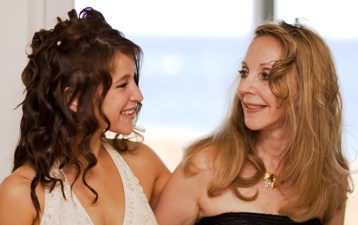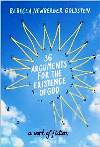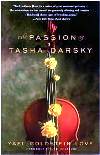Growing up Yael Goldstein Love's mom, Rebecca, would enchant her with great stories. She knew that Yael loved the power of sustained make-believe, thus it came as little surprise as the daughter who loved stories crossed over from a precocious kid to a writer.
 How did you as a mom feel when you learned your child wanted to write a book?
How did you as a mom feel when you learned your child wanted to write a book? Rebecca: I think I’d more or less always expected Yael to be a writer. She is the most story-enchanted person I know, having fallen under the magic of sustained make-believe at a very early age. I’m afraid I exploited that a bit, getting her to cooperate during her terrible two’s by weaving her and whatever it was I wanted her to do into the tale of Cinderella, far and away her favorite plot at that age. Was Yael balking at getting into her stroller? All I had to do was wave my magic wand (a spatula would do) and suggest it was a pumpkin-turned-golden-chariot.
All of this is to say that I wasn’t surprised the day she came over my place, her head crammed with a possible novel. She was still in college when she came over that Saturday, and told me, a bit tentatively at first, about th e characters and plotline that were quickening within her. The sequence of my thoughts and emotions were these: “This really is a book and not just a short story.” “This a book I’d like to read.” “Hell, this is a book I’d like to write.” That last thought was the most exciting one to me, a signal that she’d crossed over from precocious kid to writer (though it also told me that I’d have to back off and not offer too much input). I only rarely have that thought about others’ work, that the possibilities opened up by their ideas are so tantalizing I’d like to explore them myself. It’s a special prickle down the back of my neck, excitement that I’m entering the terrain of a truly interesting work. It seemed propitious that it was my daughter who was provoking the prickle.
e characters and plotline that were quickening within her. The sequence of my thoughts and emotions were these: “This really is a book and not just a short story.” “This a book I’d like to read.” “Hell, this is a book I’d like to write.” That last thought was the most exciting one to me, a signal that she’d crossed over from precocious kid to writer (though it also told me that I’d have to back off and not offer too much input). I only rarely have that thought about others’ work, that the possibilities opened up by their ideas are so tantalizing I’d like to explore them myself. It’s a special prickle down the back of my neck, excitement that I’m entering the terrain of a truly interesting work. It seemed propitious that it was my daughter who was provoking the prickle.
 e characters and plotline that were quickening within her. The sequence of my thoughts and emotions were these: “This really is a book and not just a short story.” “This a book I’d like to read.” “Hell, this is a book I’d like to write.” That last thought was the most exciting one to me, a signal that she’d crossed over from precocious kid to writer (though it also told me that I’d have to back off and not offer too much input). I only rarely have that thought about others’ work, that the possibilities opened up by their ideas are so tantalizing I’d like to explore them myself. It’s a special prickle down the back of my neck, excitement that I’m entering the terrain of a truly interesting work. It seemed propitious that it was my daughter who was provoking the prickle.
e characters and plotline that were quickening within her. The sequence of my thoughts and emotions were these: “This really is a book and not just a short story.” “This a book I’d like to read.” “Hell, this is a book I’d like to write.” That last thought was the most exciting one to me, a signal that she’d crossed over from precocious kid to writer (though it also told me that I’d have to back off and not offer too much input). I only rarely have that thought about others’ work, that the possibilities opened up by their ideas are so tantalizing I’d like to explore them myself. It’s a special prickle down the back of my neck, excitement that I’m entering the terrain of a truly interesting work. It seemed propitious that it was my daughter who was provoking the prickle.What made you want to follow in your mom’s footsteps on
becoming a writer? (for the child)
 Yael: When I was a child, my mother loved to talk about her work and I loved to listen. What this meant was that characters and plotlines swelled and vivified, dulled and shriveled right beside me as I ate dinner and brushed my teeth and went to bed. You might say we were a halfway house for the semi-existent, a place where characters stopped to find themselves and their narratives, and then moved on. Watching my mother feel through and for these characters --- to listen to her angrily describe a betrayal she herself had rigged that morning --- was both exciting and illuminating. One time --- I must have been about nine, because my sister was a toddler --- my sister and I walked into the kitchen to find our mother stirring a pot of soup with a labored, tragic air. She didn’t look at us when we came in the room, and when I asked her what was wrong she sighed, “Vanessa is dead.” A little loony? Yes. Worth making fun of for decades to come? Undoubtedly. But in the moment it was rousing. This was my mother feeling the guilty grief of killing off a young charge. This was the sort of singular emotional moment --- a peek at seldom-glimpsed psychic places --- that in most contexts would have meant my life was about to be optioned by Hollywood. But it wasn’t really happening. The emotional life of our house had a fascinatingly dense texture with no real-world repercussions. I knew from an early age that I wanted this to be true of any home I lived in, any life I chose for myself. I think it’s telling that my sister is also a writer, a poet.
Yael: When I was a child, my mother loved to talk about her work and I loved to listen. What this meant was that characters and plotlines swelled and vivified, dulled and shriveled right beside me as I ate dinner and brushed my teeth and went to bed. You might say we were a halfway house for the semi-existent, a place where characters stopped to find themselves and their narratives, and then moved on. Watching my mother feel through and for these characters --- to listen to her angrily describe a betrayal she herself had rigged that morning --- was both exciting and illuminating. One time --- I must have been about nine, because my sister was a toddler --- my sister and I walked into the kitchen to find our mother stirring a pot of soup with a labored, tragic air. She didn’t look at us when we came in the room, and when I asked her what was wrong she sighed, “Vanessa is dead.” A little loony? Yes. Worth making fun of for decades to come? Undoubtedly. But in the moment it was rousing. This was my mother feeling the guilty grief of killing off a young charge. This was the sort of singular emotional moment --- a peek at seldom-glimpsed psychic places --- that in most contexts would have meant my life was about to be optioned by Hollywood. But it wasn’t really happening. The emotional life of our house had a fascinatingly dense texture with no real-world repercussions. I knew from an early age that I wanted this to be true of any home I lived in, any life I chose for myself. I think it’s telling that my sister is also a writer, a poet.Are you each other’s first readers?
Yael: Yes, my mother is always my first reader. Partly, of course, this is just because it’s easier to hear, “This isn’t working” from someone who you know loves you, but it’s also because I know can trust her, as I can no one else, to give me feedback without in any way violating my initial sense of where I wanted to take the project. I know a lot of excellent readers, readers whose advice I find invaluable, but no one else matches her in that particular skill.
Rebecca: I often tell people that I selfishly raised my two daughters to be the best readers in the world so that I would never have to join a writers’ group in order to be critiqued. Yael and her sister are always my first readers, though recently my fairly new husband has been allowed into the select group. Danielle, as a poet, is always most concerned about individual lines. She’s hyper-sensitive to anything the least bit hackneyed; whereas Yael will hazard more global criticisms.
What is your favorite book of those your mother wrote?
Yael: The latest, 36 ARGUMENTS FOR THE EXISTENCE OF GOD: A WORK OF FICTION. Of all her books this one seems to me to contain the most of her: her brilliant philosophical mind, the profligate generosity that goes into creating her characters, her magnificent wit. Only she could have written such a subtle, fair-minded, hilarious, heartrending analysis of the science-religion debates, and I am so grateful to her for doing so. I think it’s an incredibly important book, and it was thrilling to watch it take form. We were living in the same city while she was writing it and literally wrote side-by-side most days, so I did really get to see it come into being.
Do you turn to each other for writing advice?
Yael: Using my mother as a reader is invaluable, and her advice usually turns out to be spot-on right, but a funny thing about advice from your mother: you (I, anyway) tend to distrust it whenever it’s along the lines of, “this is working” or “keep things the way they are.” Whenever she gives her stamp of approval I start to doubt how objective she is. So I prefer her brutal advice. When she gives me brutal advice I don’t feel the need to run off for a second and third opinion. A brutal suggestion from her I trust.
Rebecca: Indeed I do. The book in which Yael’s advice was most essential was a non-fiction book of mine, INCOMPLETENESS:THE PROOF AND PARADOX OF KURT GÖDEL. This book deals with a great mathematical logician and it lays out his most important work. As sometimes happens when a writer has been immersed in a subject for a while, she can forget how difficult the subject truly is, leave out sign posts that will guide the reader. That phrase “sign posts” was actually the one that Yael used when she was critiquing my manuscript. Her suggestions as to how to help the mathematically unsophisticated reader follow the logic of the proof absolutely rescued the book. The book is dedicated to her, and never did a dedicatee deserve it more.
As you were growing up how did you feel about your mom being a writer?
Yael: I was five years old when my mother published her first novel, THE MIND-BODY PROBLEM. In the adult world, I gather, the book was a heady hit, but the reviews in Mrs. Shlussel’s nursery school classroom were severe. “My mommy has a picture of your mommy without her clothes on,” was the general opinion making the rounds at the cubbies. The cover of the book in fact shows Balthus’s NUDE BEFORE A MIRROR, the subject of which looks nothing like my mother, but pleading this was a dead end. The playschool pundits had spoken, and they weren’t about to recant. I was forced to live for days with the misconception that my mother was in the altogether on coffee tables all over town, and though it soon faded into irrelevance, if not oblivion, as more interesting scandals crested over the building blocks, this first brush with ad hominem literary criticism taught me a valuable lesson: if you are the child of a novelist, there will always be someone, somewhere who thinks they’ve seen your mother naked.
Has the fact that you are both writers brought you closer together, or does it cause conflict?
Yael: People often ask me whether it is hard to share a field with my mother. I tell them it is, but not for the reasons they imagine. I don’t worry about getting stuck in her shadow --- it’s not a bad place to be. What I worry about is turning the vulnerability on her, forcing her to deal with people who think they’ve seen me naked. Whether that’s been hard for her or not I’m not sure --- I don’t think she’d tell me if it were --- but there is a compensatory thrill to sharing a field. We’ve always been very close, but trading manuscripts back and forth, traipsing in and out of one another’s imaginations has deepened our relationship.
Rebecca: The only thing that is hard for me to bear is knowing the vulnerability of the writer and not being able to protect my daughter from this.
Strange to say, it wasn’t Yael’s becoming a writer that brought us closer, at least from my perspective, but rather her majoring in philosophy. That is my field; I’ve been a professor of philosophy most of my life. Philosophy involves a very special way of thinking, and Yael’s becoming herself intimate with this way of thinking (which is, of course, part of what she brings to her writing) seemed to me to make us more of one mind, of one world. It made me smarter in her eyes as well. I’m an impractical person and lost a lot points in the motherhood sphere by being a little less acquainted than I ought to be with the “real world.” I was the only mother who not only didn’t know where to buy whatever it was that was absolutely essential, that week, to buy; I’d get hopelessly lost trying to follow the directions I’d gotten from some more competent mom. Hopeless. But if you need someone to explain what Descartes is up to in his Second Meditation there’s just not a better mom on the block. Once Yael majored in philosophy (followed by her sister), I could feel my IQ rising.
How did you or will you celebrate your child’s first release?
Rebecca: I celebrated the publication of Yael’s brilliant novel, OVERTURE, by becoming an insufferable mother, quoting the rave reviews --- did you know that the New York Times Book Review spoke of her “brooding genius?” --- at every opportunity I could grab. Like right now.
The countdown to publication day is a time full of anxiety. What advice do you as a mom and an author give your child as that day approaches?
Rebecca: Writing is so intensely private, and publication is so intensely public, and the transition between these intensities can be both exhilarating and punishing, and is always nothing less than terrifying. Yael has seen me suffer through my publications for all of her life. She’s seen me prostrated with despair when a publication goes badly, when it seems to me that years and years of work has come to naught because of a cranky reviewer with national syndication. And then she’s seen me get down to work on the next book. And that’s the most important advice I have to offer. That’s what I hope puts all of the terror of releasing a book into its proper perspective. Just like virtue, it’s the work that is its own reward. Return to the only thing that matters in this business. Return to the work.
What’s your favorite snack food/drink when you are writing?
Yael: Coke Zero.
Rebecca: Dry cereal.
What do you think was the best present you gave your mother on Mother’s Day?
Yael: About 10 years ago I forgot all about Mother’s Day, didn’t call, didn’t write, didn’t buy a gift. To make up for it I created a fake IRS form, Schedule SRE: MISSED MOTHER’S DAY. I know it sounds corny, but trust me when I say it was all in the execution. I am fairly convinced that this was the best thing I have ever written and will ever write.
What was the best present you received from your “writer child” on Mother’s Da?
Rebecca: After my first marriage broke up, when Yael was in college, she wrote me a hilarious role-reversal letter for Mother’s Day, which began “Now that you’re all grown up and finally living on your own.” She enacted the role of parent to perfection, offering advice such as, “I don’t know if you realize what a desirable and beautiful young lady you’ve become. You’re going to attract a lot of male attention, and I want you to be ready for it. Don’t let the first smooth talker turn your pretty head. Hold yourself in keep for a man who will respect the things you most respect in yourself.” It was at once so funny and so poignant. Not for the first time and not for the last, I had to marvel at this daughter of mine.
Rebecca Goldstein's latest novel, 36 ARGUMENTS FOR THE EXISTENCE OF GOD: A Work of Fiction, and Yael Goldstein Love's THE PASSION OF TASHA DARSKY are available wherever books are sold.






